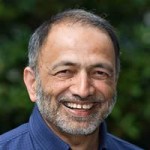By Luis Tassan
On May 13, 2013 a few members of the AAUW Riverside Branch attended a World Affairs Council of Inland Southern California presentation by Professor Ashok Kotwal on Why Is So Much of our Globe Still So Poor?….. How poverty can be pushed to decline.” Professor Kotwal is a Professor of Economics and Director of the Bachelor of International Economics Program at the University of British Columbia in Vancouver, Canada. He is also the Editor-in-Chief of Ideas for India, an economics and policy portal intended to serve as a common platform and source for ideas and On May 13, 2013 a few members of the AAUW Riverside Branch attended a World evidence on policy issues in India. http://www.ideasforindia.in/About.aspx
Professor Kotwal began his program with the stark reality that about 1.3 billion people still live on less than $1.25 a day, while 3 billion people (almost half the world population) lives on less than $2.50 a day. One fourth to one third of the children in the developing countries under the age of 5 are estimated to be underweight and have stunted growth. UNICEF estimates that 25,000 children die EACH DAY due to reasons attributable to poverty.
With this dire reality as a backdrop Dr. Kotwal proceeded to address the following questions: 1) Why is poverty so persistent in many parts of the world? 2) Is it related to structural reasons or culture or both? 3) How can poverty decline in a sustainable way and be extended across more countries in the next 20 years? Much of the answers to this he also attributes to the work of Daron Acemoglu and James Robinson in their book Why Nations Fail (2012, New York).
In answering the first of these questions—why is poverty so persistent in many parts of the world?— Professor Kotwal introduced his audience to the terminology of “extractive” and “inclusive” institutions and their effect on poverty in a country. Using the stark examples of North and South Korea or Botswana and The Congo Professor Kotwal explains how countries with inclusive institutions—where political rights are broadly distributed and the government is accountable and responsive to its citizens, the people are better able to take advantage of economic opportunities. In contrast, countries where poverty persists appear to be controlled by “extractive” institutions which concentrate power and opportunity in the hands of only a few for the benefit of only a few. Hence he attributes persistent poverty to institutions and politics in those countries.
In answering the second of these questions professor Kotwal states that his research has not found that poverty is related to culture. This came as a surprise to some in the audience who wondered how it is that the caste system in India is not a contributing factor to its persistent poverty. In answering this question professor Kotwal reinforces the notion that extractive institutions which seek control of power, resources and money for the benefit of a few are the cause of persistent poverty.
How can poverty be reduced in a sustainable way over the next 20 years? These “extractive institutions” have to evolve into “inclusive institutions” so that more people can participate in economic prosperity. Professor Kotwal explains how countries where a large population is still engaged in the agricultural sector, where the worker is not protected by “inclusive institutions” like a labor union so that they have protections against job losses, benefits in the event of illness and protections against “unforeseen calamities” that affect their crops will continue to experience great poverty. Ideas For India (February 25, 2013. http://www.ideasforindia.in/Article.aspx?article_id=110)


Wish I had been there. Great article.